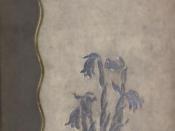Dickinson and God
God, to Emily Dickinson, is seen in more than a church or a cathedral. God is seen in her poems in relationship to such themes as nature and the individual existence. These thematic ties are seen in such poems as "It might be lonelier," and "Some keep the Sabbath going to church."
"Some keep the Sabbath going to Church" consists of the differences that exist between Dickinson's way of being close to God and many other people's ways of being close to God. While some may go to church every Sunday in honor of the Sabbath, Dickinson stays home and reflects. "A bobolink" is her "Chorister" and instead of a clergyman preaching, "God preaches" (Hillman 36). Dickinson believes she can find God on her own, without the assistance of a preacher or such. Nature, to Dickinson, is the equivalent of a chapel, its congregation, its clergyman, and its choir.
Rica Brenner, a critic, wrote that she believed, "Nature, for Emily Dickinson, was the means for the enjoyment of the senses," (Brenner 288). Dickinson finds God, in the fullest sense, in nature. She does not feel as if a church would really convey the full affect of God, at least not to her. "The Sunday God of New England Orthodoxy, distant, awful, cruelly stern, was not for her," (Brenner 274).
Dickinson, though she progressively conveys a disdain for the church and its idea of God in her poems, cares for people and nature. She values them above most other things and sees God in them. It can even be said that she rejects the church in the name of God, nature, and the human race, in addition to doing it in the name of her own sanity. Rica Brenner, commenting on "Some keep the Sabbath going...



Good essay
You have impressed me by your deep though about Emily and her work. You go far than that by digging the phylosophy about GOd.Well done.
2 out of 2 people found this comment useful.